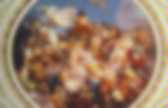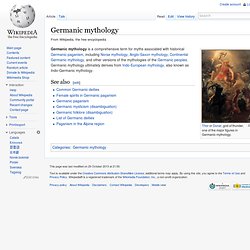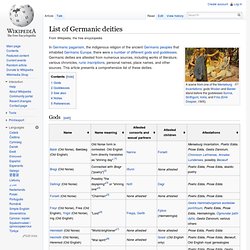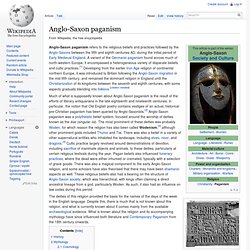

Germanic mythology. Thor or Donar, god of thunder, one of the major figures in Germanic mythology.

Germanic mythology is a comprehensive term for myths associated with historical Germanic paganism, including Norse mythology, Anglo-Saxon mythology, Continental Germanic mythology, and other versions of the mythologies of the Germanic peoples. Germanic mythology ultimately derives from Indo-European mythology, also known as Indo-Germanic mythology.
List of Germanic deities. In Germanic paganism, the indigenous religion of the ancient Germanic peoples that inhabited Germanic Europe, there were a number of different gods and goddesses.

Germanic deities are attested from numerous sources, including works of literature, various chronicles, runic inscriptions, personal names, place names, and other sources. This article presents a comprehensive list of these deities. Gods[edit] Anglo-Saxon paganism. Anglo-Saxon paganism refers to the religious beliefs and practices followed by the Anglo-Saxons between the fifth and eighth centuries AD, during the initial period of Early Medieval England.

A variant of the Germanic paganism found across much of north-western Europe, it encompassed a heterogeneous variety of disparate beliefs and cultic practices.[1] Developing from the earlier Iron Age religion of continental northern Europe, it was introduced to Britain following the Anglo-Saxon migration in the mid fifth century, and remained the dominant religion in England until the Christianization of its kingdoms between the seventh and eighth centuries, with some aspects gradually blending into folklore. [citation needed] The right half of the front panel of the seventh century Franks Casket, depicting the pan-Germanic legend of Weyland Smith also Weyland The Smith, which was apparently also a part of Anglo-Saxon pagan mythology.